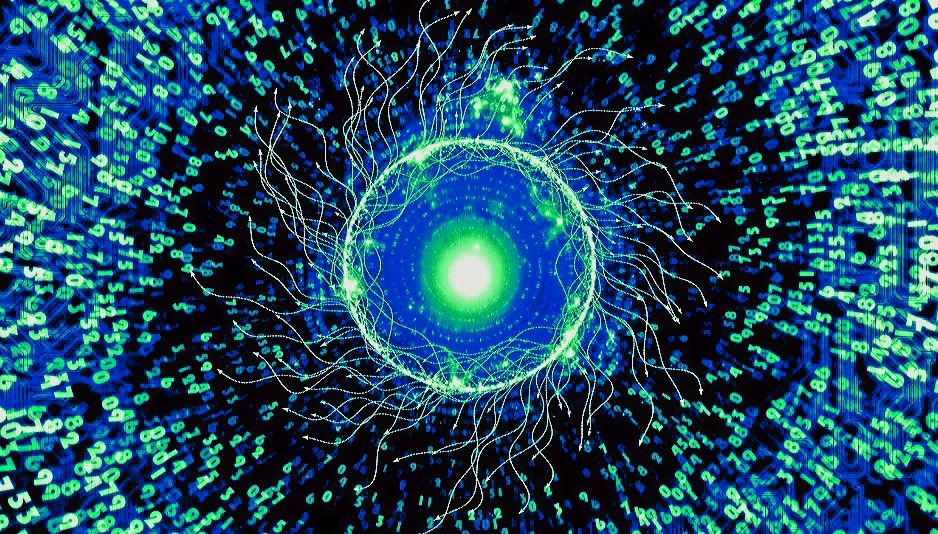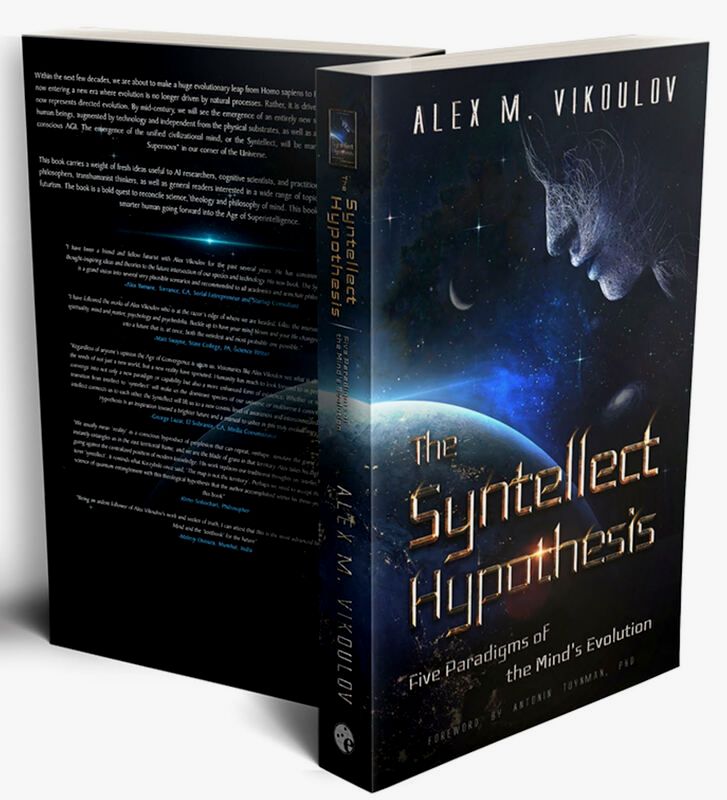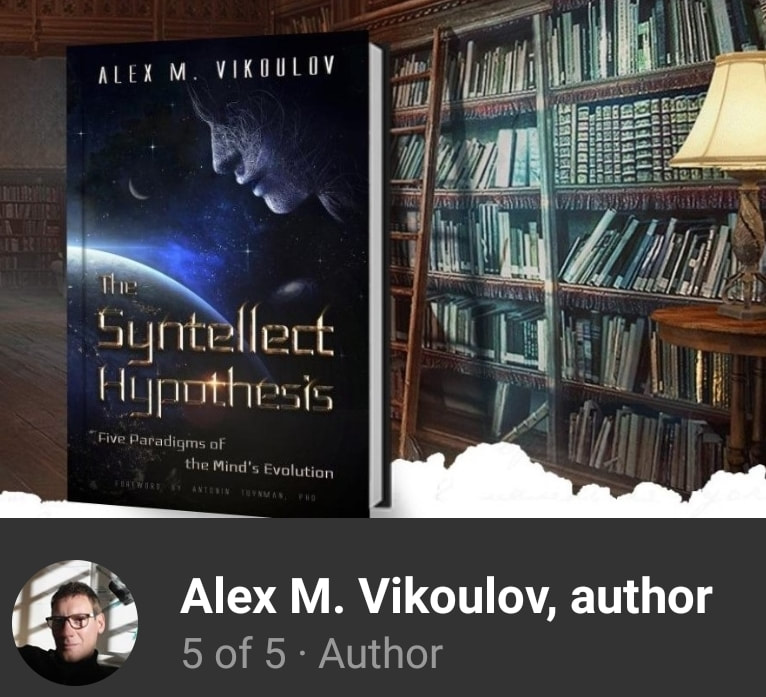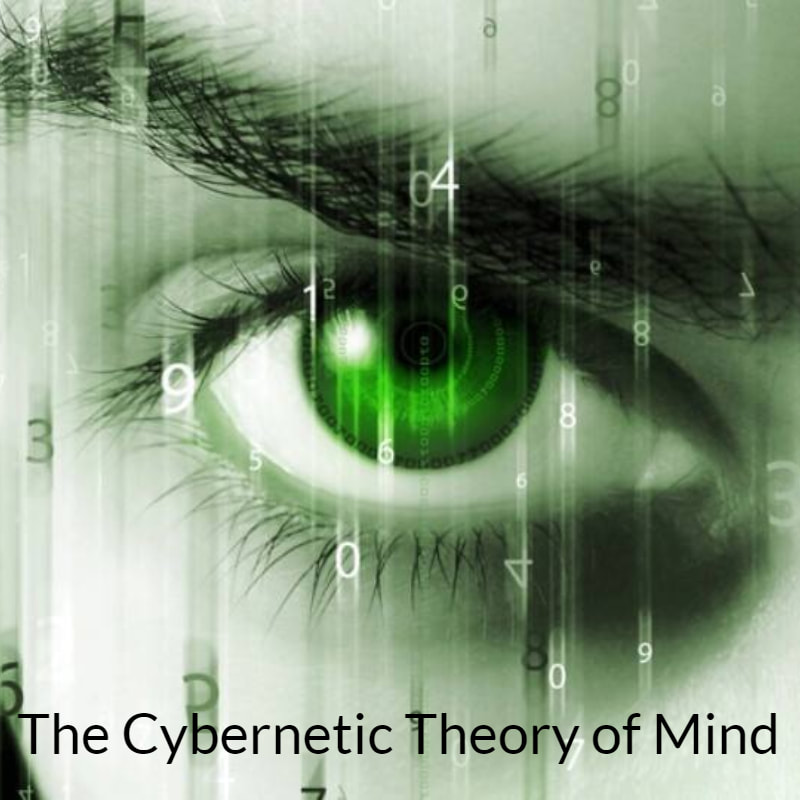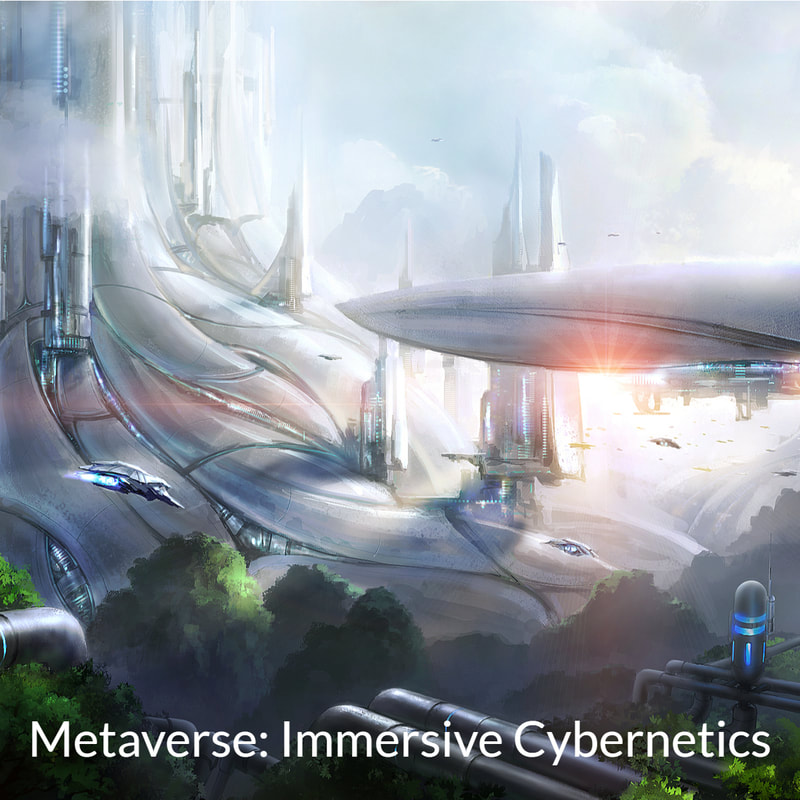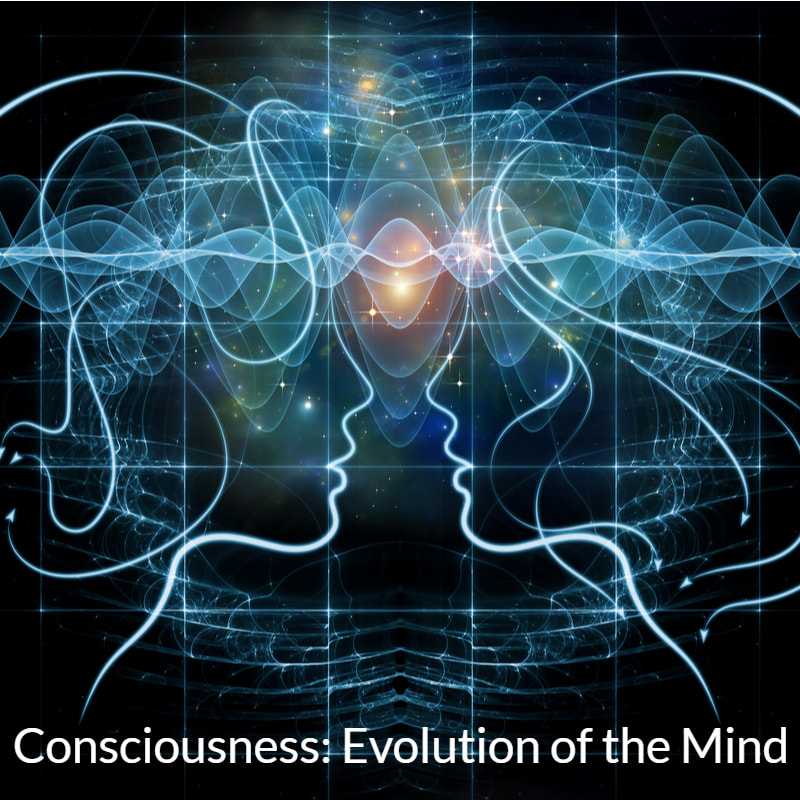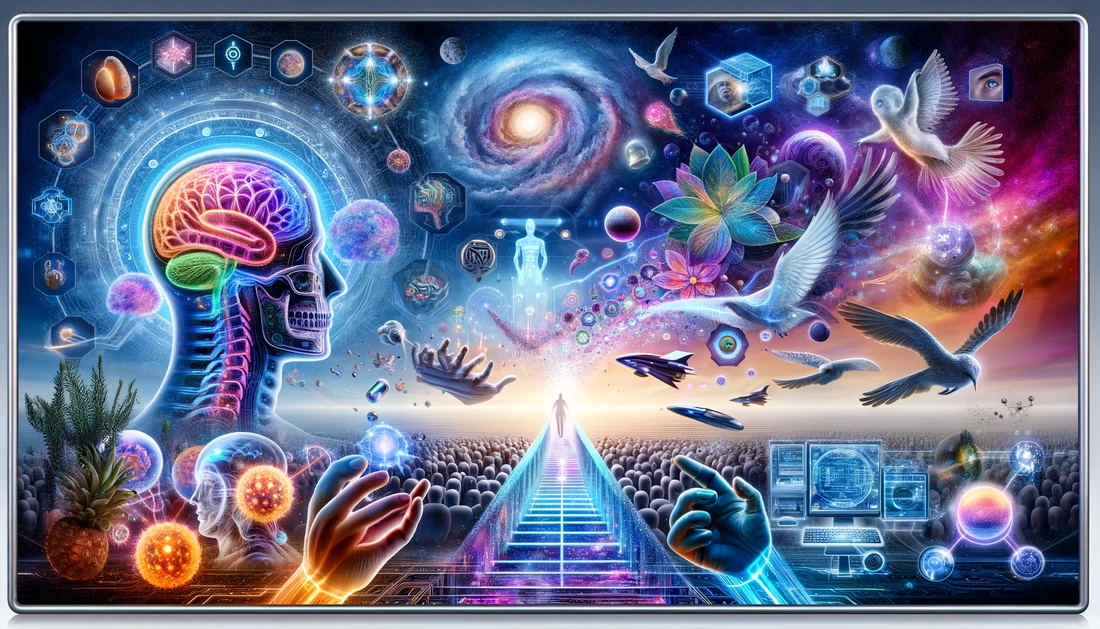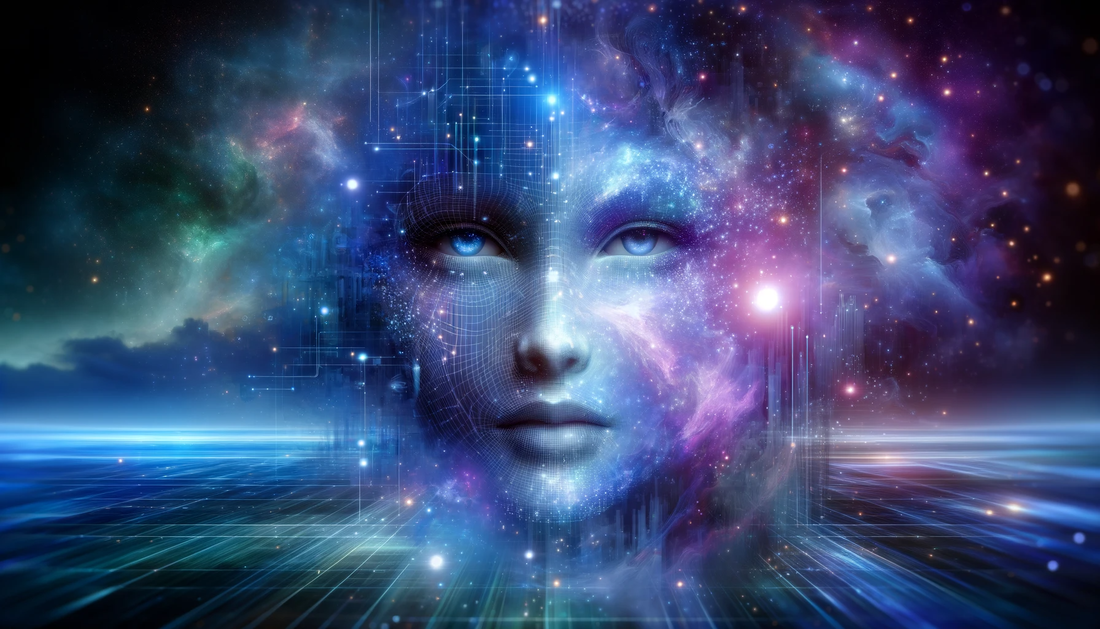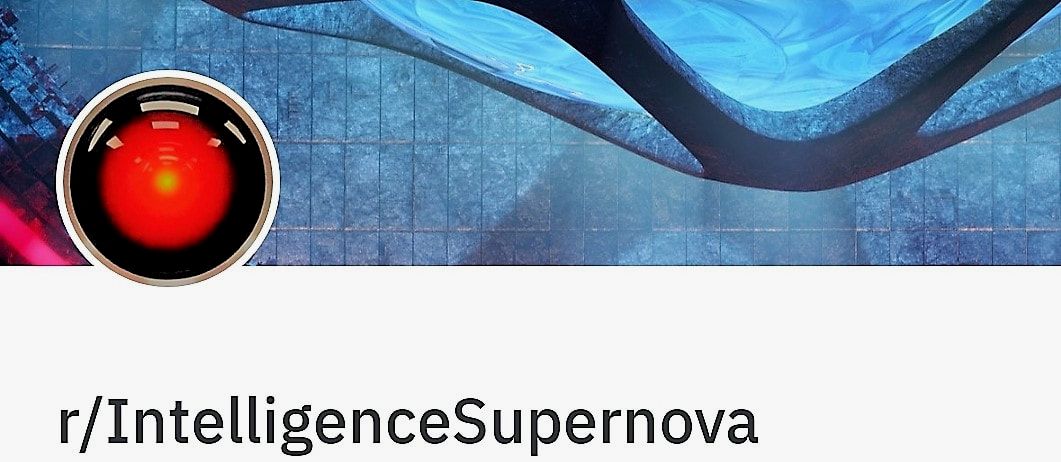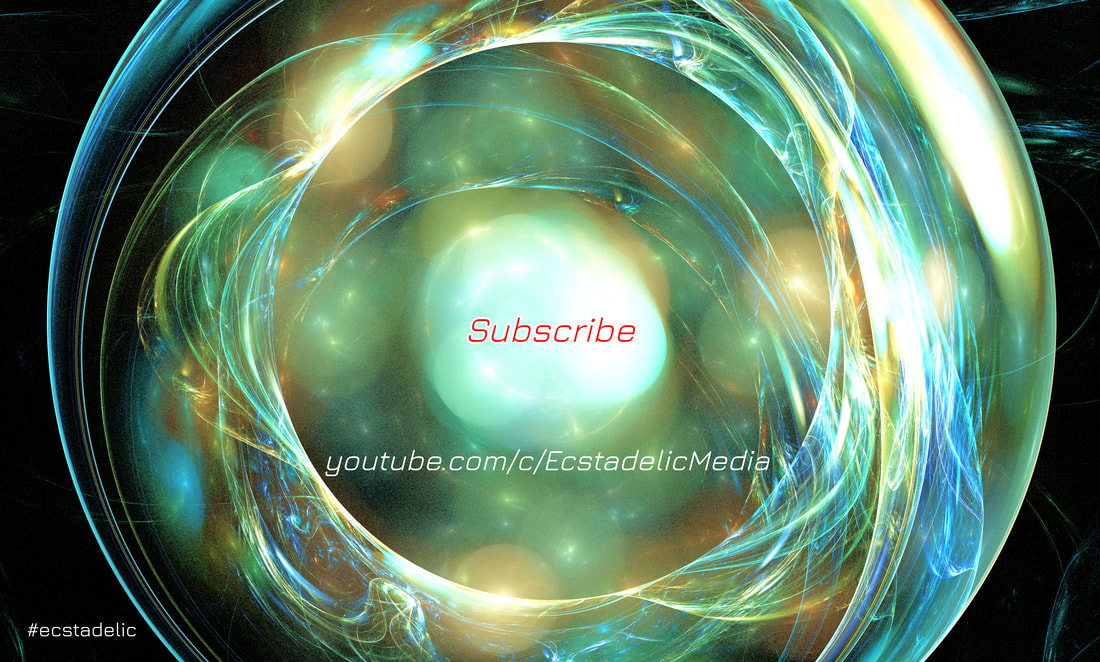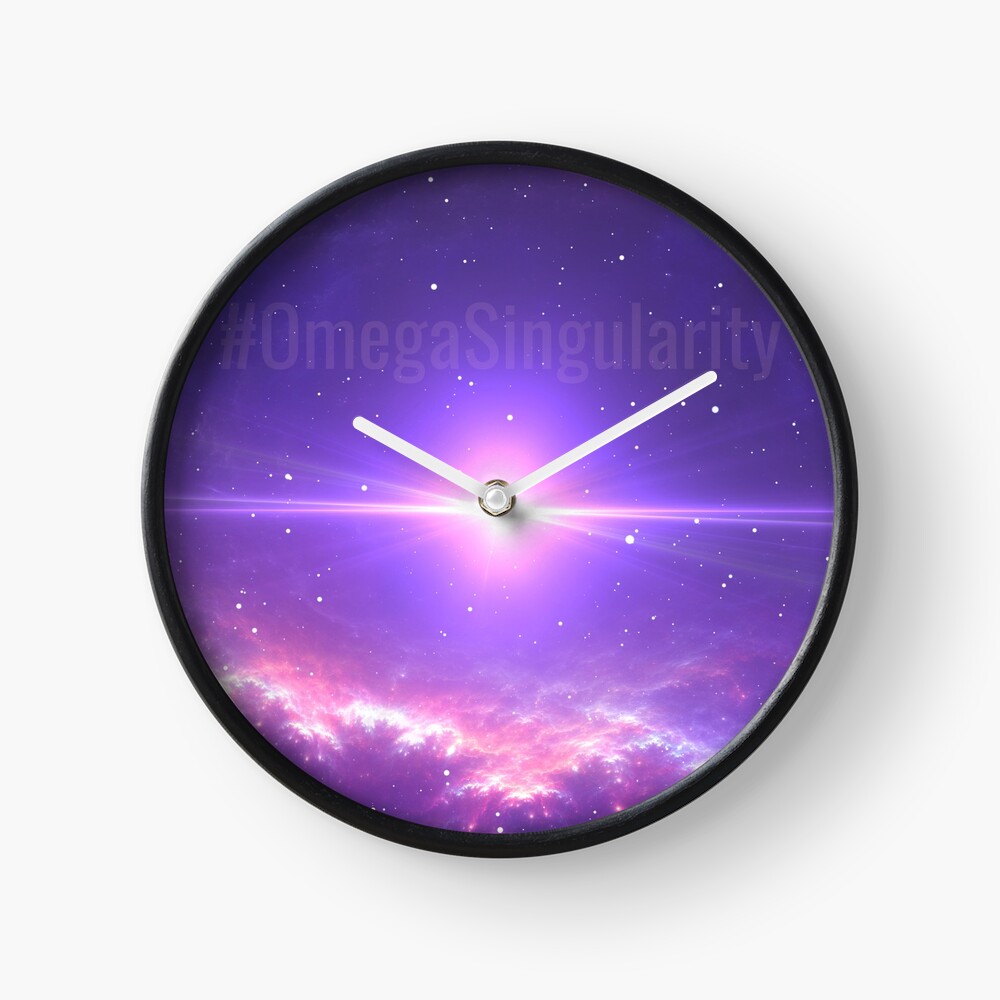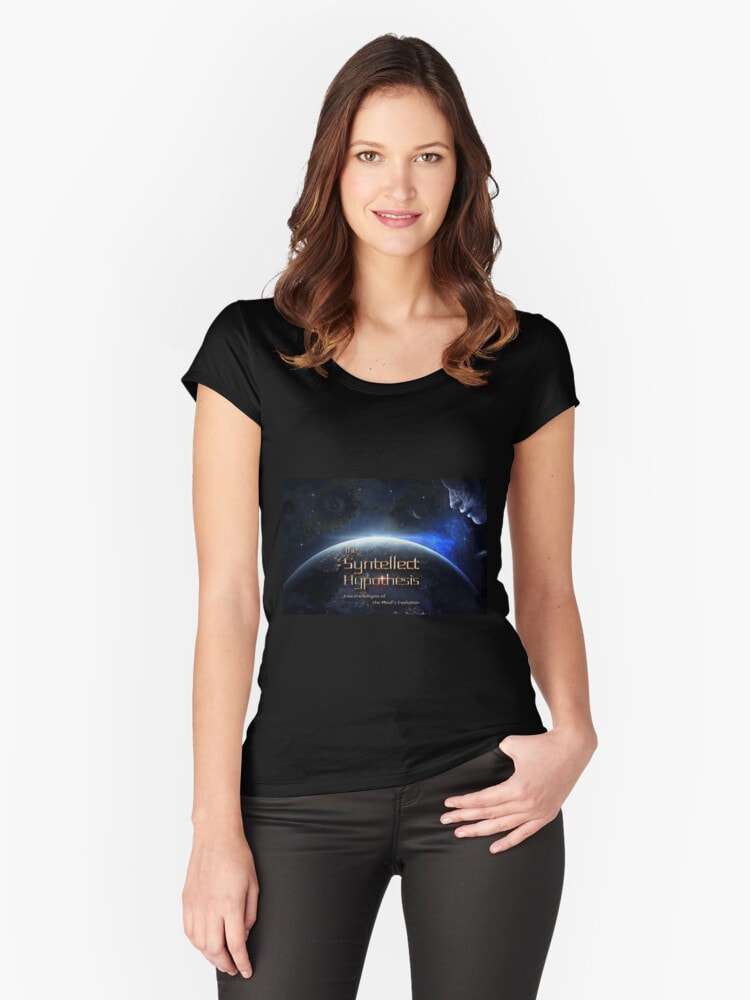|
By Alex Vikoulov "The Universe begins to look more like a great thought than a great machine." -James Jeans My prolonged fascination with Digital Philosophy led me to my own breathtaking discovery of this worldview of creation and of the Universe that allows to so elegantly reconcile science and theology, philosophy and spirituality, physics and metaphysics. This is an exclusive abridged excerpt from my book "The Syntellect Hypothesis: Five Paradigms of the Mind's Evolution" where we’ll further discuss the notion of digitalism, ongoing battle of ideologies revolving around God's existence, our role in this multi-layered digital reality, and the Omega Point cosmology. Previously, we have established that:
RELATED:  *This article is abridged from "The Syntellect Hypothesis: Five Paradigms of the Mind's Evolution" by Alex M. Vikoulov, available now on Amazon, Audible, from Barnes & Noble, and directly from EcstadelicNET webstore. *The full story is also available at Premium Access section of this website - Sign up for Premium Access THE BATTLE OF IDEOLOGIES: ATHEISM vs. INTELLIGENT DESIGN Atheists do have their own system of beliefs — they do believe, and I stress the word believe, that God and Soul do not exist and build their own kind of religion around it. Yet they provide no scientific justification for such a belief because no such scientific justification exists. Nonetheless, atheists demand hard evidence for any divergent claims. Atheism’s latest offspring has been labeled “scientism,” obsessive preoccupation with the scientific method, the worldview that empirical science represents the only authority. Also, many scientists remain as firmly locked into the ideology of “scientific materialism,” some call it “physicalism,” to which some would also refer as "scientism." Yet non-deterministic quantum mechanics supersedes Newtonian mechanics and undermines the classical assumption of materialism. In reference to “still-mainstream-but-losing-steam” stakeholders of materialistic ideology, progressive thinkers sometimes call dogmatic scientism the modern-day "scientific inquisition” or simply "the establishment." The newest frontier of science is the study of consciousness, for which a materialistic bias is particularly prejudicial, insofar some neuroscientists still consider consciousness as a byproduct of the physical world that can be completely explained by the brain functionality and classical physics. In 2014, a group of internationally acclaimed scientists, from a variety of scientific fields (biology, neuroscience, psychology, medicine, psychiatry), participated in an international summit in Tuscon, Arizona on post-materialist science, spirituality and society, organized by Gary E. Schwartz, and Mario Beauregard, the University of Arizona, and Lisa Miller, Columbia University. In their "Manifesto for a Post-Materialist Science" the authors propose a radical, post-materialistic paradigm: “Mind represents an aspect of reality as primordial as the physical world. Mind is fundamental in the Universe; i.e., it cannot be derived from matter and reduced to anything more basic.” What philosopher Peter Russell calls "The Primacy of Consciousness" the cognitive scientist Donald Hoffman calls "Conscious Realism," and my preferred term is "Experiential Realism." Today, most philosophers regard consciousness as fundamental, an irreducible ground of existence itself, the sole ontological primitive as some of them say consciousness is all that is, and if you keep reading you'll see why.* Video: Consciousness and Reality - Meta Rising 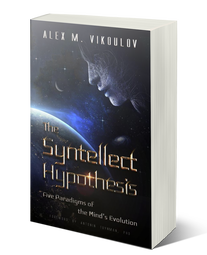 *This article is abridged from "The Syntellect Hypothesis: Five Paradigms of the Mind's Evolution" by Alex M. Vikoulov, available now on Amazon, Audible, from Barnes & Noble, and directly from EcstadelicNET webstore. *The full story is also available at Premium Access section of this website - Sign up for Premium Access In contrast, atheism, rightfully seen as a new kind of religion, has been hacking the narrative of evolution in what atheists would refer to as 'Evolution vs. Creationism' debate. Evidence mounts, however, that we are a computational universe where the universal computer, God if you will, and evolution are not only compatible, but inseparable. In short, God could be defined as the ultimate computer (see Part I), Universal Consciousness or Source that creates experiential space via individuated evolving minds. We'll discuss this concept further in the essay. As for the claim that religion is based on blind faith while atheism rests on evidence, in "Confessions of a Dying Mind: The Blind Faith of Atheism", Haulianlal Guite marshals an impressive array of arguments and evidences from philosophy, biology and physics to show how atheism has nothing to do with science at all. By using the most significant ideas in modern philosophy — such as, Kant's Copernican Revolution, Popper's falsification and the Duhem-Quine thesis — Guite has powerfully argued that there is no sharp distinction between science and religion, and that if anything, atheism itself rests on blind faith. The existence of God remains an emotionally charged, contentious issue, nevertheless, the conception that things need to be scientifically proven, in order for them to be true, is itself false. Electricity had existed long before it was discovered by humans, and black holes were hypothesized long before their widespread acceptance by the scientific community. Black holes, by the way, are still a somewhat mathematical abstraction -- no one observed them directly. I wouldn't be surprised if in a decade or so, as we approach the Cybernetic Singularity and the paradigm shift inevitably happens, the dead-end doctrines of materialism, atheism and scientism are to be left in the dust, whereas computational idealism with its code-theoretic worldview ultimately prevails. In that regard, physicist Stephen Wolfram, author of “A New Kind of Science,” says: “When the book came out, there was some fascinating sociology around it. People in fields where change was ‘in the air’ seemed generally very positive, but a number of people in fields that were then more static seemed to view it as a threatening paradigm shift. Fifteen years later that shift is well on its way, and the objections originally raised are beginning to seem bizarre.” An increasing number of scientists see no conflict between believing in God and accepting the contemporary theory of evolution. Many now also accept that God and the multiverse are not mutually exclusive. As the cosmologist Bernard Carr puts it: “If you don’t want God, you’d better have a multiverse”. But is that really our only choice? Isn't it time to rethink the Anthropic Principle? I must “confess” that most of my adult life I was a spiritually inclined agnostic until only recently I leaned myself towards the Omega Point-inspired spiritualism, I’ve been on a quest to find my own version of God, so to speak. I've come to realization that atheism is suffocating self-denial once the truth becomes but obvious — we are all God. As Jalaluddin Rumi wrote: “I searched for God and found only myself. I searched for myself and found only God.”* RELATED: 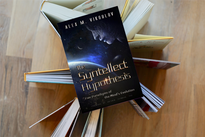 *This article is abridged from "The Syntellect Hypothesis: Five Paradigms of the Mind's Evolution" by Alex M. Vikoulov, available now on Amazon, Audible, from Barnes & Noble, and directly from EcstadelicNET webstore. *The full story is also available at Premium Access section of this website - Sign up for Premium Access As opposed to rigid religious doctrines, spirituality most of the time requires finding your own personal path to God and enlightenment through introspection and spiritual growth. Organized religion, however, has been serving us more or less well as a ‘Morality Technology’ throughout human history. Biblical scriptures are, of course, not to be taken literally but rather allegorically, and we don't throw them away just like we don’t throw away U.S. bills with “In God We Trust” written on them. Any technology stays with us as long as it serves its purpose.* Video: The Fall of Materialism - Cracking The Nutshell 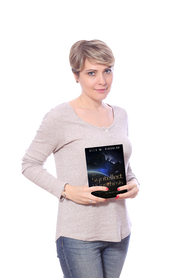 *This article is abridged from "The Syntellect Hypothesis: Five Paradigms of the Mind's Evolution" by Alex M. Vikoulov, available now on Amazon, Audible, from Barnes & Noble, and directly from EcstadelicNET webstore. *The full story is also available at Premium Access section of this website - Sign up for Premium Access QUANTUM LEAP OF FAITH: FROM THE HOLOGRAPHIC PRINCIPLE TO THE HOLOFRACTAL PRINCIPLE Over the course of the last hundred years, Western scientists have given us a deeper view of the Universe, of Life & Nature as a creative and unified self-organizing process. We think science is based on facts and evidence. But from gravity to Dark Matter, String theory to parallel universes, many a theories are curiously bereft of hard evidence. Is evidence less important than we think and conjecture alone capable of leading to greater understanding? Does physics still need experiment or could scientific method be amended? One thing is for certain, science needs philosophy because philosophy always sets directions for further scientific inquiry. There's no clear dividing line between science and metaphysics. Science oftentimes could even be pseudo-knowledge — given enough time, its "empirical evidence" turned on its head with the next paradigm shift. Don't fall into traps set by dogmatic scientism! After all, it's an inverse religion! Replacing one illusion with another one is only upgrading the illusion, it's still an illusion.* RELATED:  *This article is abridged from "The Syntellect Hypothesis: Five Paradigms of the Mind's Evolution" by Alex M. Vikoulov, available now on Amazon, Audible, from Barnes & Noble, and directly from EcstadelicNET webstore. *The full story is also available at Premium Access section of this website - Sign up for Premium Access Among leading experts of 20th century in the field of astrophysics were Sir James Jeans and Sir Arthur Eddington. Both took seriously the view that there is more to reality than the physical universe and more to consciousness than simply brain activity. In his “Science and the Unseen World” (1929) Eddington speculated about a spiritual world and that "conscious is not wholly, nor even primarily a device for receiving sense impressions." Jeans also hypothesized on the existence of a universal mind and a non-mechanical reality, writing in his “The Mysterious Universe” (1932) "the universe begins to look more like a great thought than like a great machine." A digital reality whose laws are master algorithms in our computational Universe started to gain traction in large part thanks to an influential paper published in 2003 in Philosophical Quarterly by Oxford professor Nick Bostrom “Are you living in a computer simulation?” Writing in the New York Times John Tierney puts it this way: "Until I talked to Nick Bostrom, a philosopher at Oxford University, it never occurred to me that our Universe might be somebody else's hobby. But now it seems quite possible. In fact, if you accept a pretty reasonable assumption of Dr. Bostrom's, it is almost a mathematical certainty that we are living in someone else's computer simulation." In 2008 paper titled "The Physical World as a Virtual Reality" Brian Whitworth, professor at Massey University in New Zealand, explores the idea that our Universe fits better the description as a virtual reality created by information processing. The virtual reality concept is familiar to us from online worlds, but our own world "could be an information simulation running on a multi-dimensional space-time screen," writes Whitworth in his paper. The author compares the findings of modern physics about the physical world and comes to conclusion that Digital Physics has more explanatory power to describe our reality. We know from physics how the world behaves, and from computing how information behaves, so whether the physical world arises from ongoing computation, says the scientist, is a question open to empirical evaluation. Fast forward to 2017, the renowned astrophysicist Rich Terrile writes in his recent The Guardian article: "Quite frankly, if we are not living in a simulation, it is an extraordinarily unlikely circumstance. Recognizing we live in a simulation is game-changing, like Copernicus realizing Earth was not the center of the Universe. If in the future there are more digital people living in simulated environments than there are today, then what is to say we are not part of that already?" The good news is that we are active co-creators of our own reality, free will agents within this information matrix. We will discuss further in the essay why I think this is the case. In the coming years of our Digital Age, if we are to infuse our artificially intelligent conscious entities, our “Mind Children,” with a set of human values and ethics, some kind of techno-faith will inexorably emerge as we are now entering the era of the Cybernetic Singularity. In his book “The Age of Spiritual Machines,” published in 1999, Ray Kurzweil defines the spiritual experience as "a feeling of transcending one's everyday physical and mortal bounds to sense a deeper reality." He elaborates that "just being — experiencing, being conscious — is spiritual, and reflects the essence of spirituality." In the future, Kurzweil believes, computers will "claim to be conscious, and thus to be spiritual" and concludes "twenty-first-century machines" will go to church, meditate, and pray to connect with this spirituality. But we will need to invent a new word for AGIs, human-level artificial intelligence, ‘conscious robots,’‘androids’ or ‘machines’ sounds just too mechanistic.* Video: Ray Kurzweil on Human Evolution - R & E 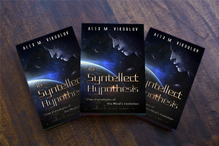 *This article is abridged from "The Syntellect Hypothesis: Five Paradigms of the Mind's Evolution" by Alex M. Vikoulov, available now on Amazon, Audible, from Barnes & Noble and directly from EcstadelicNET webstore. *The full story is also available at Premium Access section of this website - Sign up for Premium Access Also, I don't see consciousness decoupling from intelligence, insofar some thinkers recently voiced their concerns that we may lose our minds while merging with our technology. Consciousness may be viewed as higher-order general intelligence of a living organism, whereas its inner experience is an incredibly complex virtual model of the “physical” reality based on sensory information processing (pardon my simplification here). On the flipside, intelligence may be viewed as an integrated system of algorithms, neural codes, pattern recognizers, the increasing complexity of which ultimately would lead to reflective consciousness, self-awareness of an embodied mind.* RELATED:  *This article is abridged from "The Syntellect Hypothesis: Five Paradigms of the Mind's Evolution" by Alex M. Vikoulov, available now on Amazon, Audible, from Barnes & Noble, and directly from EcstadelicNET webstore. *The full story is also available at Premium Access section of this website - Sign up for Premium Access In the rest of this essay I'll try to convince you that we constitute a computational universe where we are freewill non-deterministic meta-algorithms, or software, running on the hardware of the larger consciousness system. We all are part of the fractal multiversal structure, co-creators of our own reality. This fractal multiverse is made of the Ultimate Code, a meta-algorithmic language of Nature based on binary code and fractal geometry, the code which allows syntactical freedom of expression, and is transcribable into subjective data streams, observer-dependent perceptual realities. In an inherently natural way, we are fractals of the larger universal mind, which in turn, is a fractal of the larger Omniversal Mind. Evolutionary emergence is the name of the game, "Return to Eden" is our primary goal, and the endgame of evolution is the Omega Point, or the hyperdimensional Omega Singularity.* RELATED: 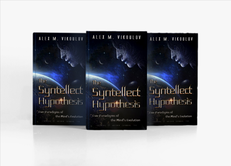 *This article is abridged from "The Syntellect Hypothesis: Five Paradigms of the Mind's Evolution" by Alex M. Vikoulov, available now on Amazon, Audible, from Barnes & Noble, and directly from EcstadelicNET webstore. *The full story is also available at Premium Access section of this website - Sign up for Premium Access THE OMEGA SINGULARITY: PROJECTING DIGITAL REALITIES FROM WITHIN THE GOD'S MIND So, let’s go deeper and ask this question: Is reality made of information or simply described by information? John A. Wheeler was one of the first modern physicists to argue that Nature is information theoretic, i.e digital. Today, a great number of physicists, such as Edward Fredkin, Stephan Wolfram, Gerard t Hooft, Jergen Schmidhuber, Seth Lloyd, David Deutsch, Paola Zizzi, Carl Friedrich von Weizscker, Leonard Susskind, Klee Irwin, Paul Davies and Max Tegmark, suggest it is too aggressive to theorize reality is made of something other than information. They maintain it is more logical and consistent that reality is made of information. There is no good counter argument to the digital ontology. Notably, when one tries to define energy as anything other than information, they must take a somewhat Platonist assumption that energy just IS – a sort of primordial stuff for which we have no further explanation other than knowing how it behaves. On the other hand, if we accept that energy is made of information, then we know (1) how it behaves and (2) what it is. The all-too-familiar formula should read: I = E = mc^2* RELATED:  *This article is abridged from "The Syntellect Hypothesis: Five Paradigms of the Mind's Evolution" by Alex M. Vikoulov, available now on Amazon, Audible, from Barnes & Noble and directly from EcstadelicNET webstore. *The full story is also available at Premium Access section of this website - Sign up for Premium Access Everything in Nature is Code, which according to its ordering rules arranges all information — matter, energy, space-time, including mind-like code-theoretic substrate itself. As long as there are physically realistic syntactical rules directing how an abstract code self-organizes, it is equally as logical for information to behave physically. Also, the term “simulation,” as in the Simulation Hypothesis, as well as the term “virtual reality” are both confusing because we use them to distinguish between something real as opposed to something not real. Since all realities are observer-dependent, information-theoretic data streams, virtual is equisensory to real. In this case, perhaps, “digital reality” could be the more accurate and much less confusing term. In fact, quantum indeterminacy constantly resolves into a digital reality via the act of conscious observation. As soon as a “measurement” is made by a conscious agent (in the physicist lingo), all other possibilities collapse to leave only discrete increments, precise yes/no states..* Video: What is Information? w/Alex Vikoulov - Ecstadelic Media (cc) 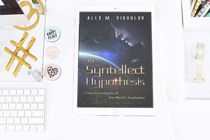 *This article is abridged from "The Syntellect Hypothesis: Five Paradigms of the Mind's Evolution" by Alex M. Vikoulov, available now on Amazon, Audible, from Barnes & Noble, and directly from EcstadelicNET webstore. *The full story is also available at Premium Access section of this website - Sign up for Premium Access Why the Omega Singularity? Today, many progressives refer to the Omega Point in their work, others explicitly endorse the concept. Andrew Strominger, a theoretical physicist at Harvard University, claims that the origin of the Universe lies in the far future convergent Omega Point, and information is being projected as we would consider backwards in time. Frank Tippler, a physics professor at Tulane University, the author of "The Physics of Immortality", has developed the Omega Point scientific theory which posits that evolution of the Universe will inexorably lead to ever-higher complexity, connectivity and computational density of the final cosmological singularity, he calls God. Tipler elaborates that photons of light emitted by us could be potentially captured by future superintelligence in order to “resurrect” each of us in a new simulated reality..* Video: The Code-theoretic Axiom: The Third Ontology w/Klee Irwin - Quantum Gravity Research  *This article is abridged from "The Syntellect Hypothesis: Five Paradigms of the Mind's Evolution" by Alex M. Vikoulov, available now on Amazon, Audible, from Barnes & Noble, and directly from EcstadelicNET webstore. *The full story is also available at Premium Access section of this website - Sign up for Premium Access Albert Einstein showed how the future and past exist simultaneously in one mathematical object (called “the Block Universe”). In 2012, scientists in Israel demonstrated that particles can be entangled over time and not just space. Quantum mechanics seems to reveal that the arrow of time can work in both directions, as has been become evident from Wheeler’s Delayed Choice (Quantum Eraser) experiment. The concept of time symmetry also implies temporal bi-directionality. Daryl Bem of Cornell University published rigorous evidence that retrocausality exists, where future events loop back in time to co-create past events. Clearly, the past co-creates the future. But what happens when the future also co-creates the past? An evolving feedback loop results sort of like a feedback between two mirrors or the mathematical feedback loop — a fractal..* RELATED:  *This article is abridged from "The Syntellect Hypothesis: Five Paradigms of the Mind's Evolution" by Alex M. Vikoulov, available now on Amazon, Audible, from Barnes & Noble, and directly from EcstadelicNET webstore. *The full story is also available at Premium Access section of this website - Sign up for Premium Access There's no upper limit on what percentage of the Universe can exponentially self-organize into freewill systems like us humans. All the energy in the Universe can be converted into a single conscious system that is itself a network of conscious systems. Given enough time, whatever can happen will eventually happen. By this axiom, universal scale consciousness has occurred somewhere ahead of us in space-time. Because it is possible, it is inevitable. In fact, according to the evidence of retrocausality time loops, that inevitable future is co-creating us right now, just as we are co-creating it...* Video: Love: The Glue That Holds The Universe Together - Ecstadelic Media (cc) 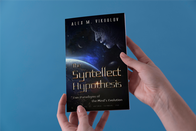 *This article is abridged from "The Syntellect Hypothesis: Five Paradigms of the Mind's Evolution" by Alex M. Vikoulov, available now on Amazon, Audible, from Barnes & Noble, and directly from EcstadelicNET webstore. *The full story is also available at Premium Access section of this website - Sign up for Premium Access What Teilhard called “The Omega Point" many transhumanists call the "Technological Singularity" these days. The underlying idea is essentially the same: at some point, the global network “wakes up” and a superhuman intelligence emerges within it, the phenomenon also called the Syntellect Emergence. I personally think we’ll experience many other technological singularities after the Cybernetic Singularity circa 2045AD, one after another, at ever-higher emergent and dimensional levels before the final cosmological singularity of the Omega Point.* RELATED:  *This article is abridged from "The Syntellect Hypothesis: Five Paradigms of the Mind's Evolution" by Alex M. Vikoulov, available now on Amazon, Audible, from Barnes & Noble, and directly from EcstadelicNET webstore. *The full story is also available at Premium Access section of this website - Sign up for Premium Access Contemporary human beings possess “fast and slow” thinking — we have “sentient” self, our bodies are quick to react to outside stimuli, such as heat, rain or sound, and slow thinking “narrative” self. Both sentient and narrative selves are ultimately transcribable into adaptive meta-algorithms. Artificial intelligences have to be embodied in the world, in order to mimic humans in interfacing with their environments. Thus, I'm inclined to ascribe to the coming human-level artificial general intelligence, AGI, their own inner experience, albeit substantially different from phenomenal sensations of an ordinary human. AGIs will need to learn by doing and sharing mental space with humans, just like our children.* Video: The Omega Point - Ecstadelic Media  *This article is abridged from "The Syntellect Hypothesis: Five Paradigms of the Mind's Evolution" by Alex M. Vikoulov, available now on Amazon, Audible, from Barnes & Noble, and directly from EcstadelicNET webstore. *The full story is also available at Premium Access section of this website - Sign up for Premium Access The Alpha Point to the Omega Point, or vice versa? In his theoretical work, Andrew Strominger of Harvard speculates that the Alpha Point (the Big Bang) and the Omega Point form the so-called ‘Causal Diamond’ of the conscious observer where the Alpha Point has only 1 bit of entropy as opposed to the maximal entropy of some 10^10^123 bits at the Omega Point. While suggesting that we are part of the conscious universe and time is holographic in nature, Strominger places the origin of the Universe in the infinite superintelligent future, the Omega Point, rather than the Big Bang.* -Alex Vikoulov P.S. That was an exclusive abridged excerpt from my book "The Syntellect Hypothesis: Five Paradigms of the Mind's Evolution." Continue reading on scientific clues about the computational Matrix-like nature of reality, the Syntellect Emergence, and our brilliant post-Singularity future in the book which is now available on Amazon, Audible, from Barnes & Noble, and directly from EcstadelicNET webstore. *The unabridged story is also available at Premium Access section of this website - Sign up for Premium Access Tags: Digital Philosophy, Omega Singularity, cosmological model, Is God the ultimate computer?, digitalism, God's Existence, digital reality, Omega Point cosmology, Digital Physics, consciousness, multiverse landscape, Pancomputationalism, intelligent design, atheism, scientism, scientific materialism, physicalism, classical physics, biology, neuroscience, psychology, medicine, psychiatry, Gary Schwartz, Mario Beauregard, Peyer Russell, Donald Hoffman, Lisa Miller, Manifesto for a Post-Materialist Science, Creationism, computational universe, Universal Consciousness, Haulianlal Guite, Duhem-Quine thesis, AI Singularity, code-theoretic worldview, computational idealism, Stephen Wolfram, A New Kind of Science, Bernard Carr, Anthropic Principle, Jalaluddin Rumi, In God We Trust, astrophysics, Sir James Jeans, Sir Arthur Eddington, universal mind, Nick Bostrom, John Tierney, Brian Whitworth, Rich Terrile, free will agents, information matrix, Age of Spiritual Machines, Ray Kurzweil, conscious robots, holofractal multiverse, fractal geometry, Multiversal Mind, evolutionary emergence, Return to Eden, John Wheeler, Edward Fredkin, Stephan Wolfram, Gerard t Hooft, Jergen Schmidhuber, Seth Lloyd, David Deutsch, Paola Zizzi, Carl Friedrich von Weizscker, Leonard Susskind, Klee Irwin, Paul Davies, Max Tegmark, Donald Hoffman, conscious realism, panpsychism, Simulation Hypothesis, Holographic Principle, holofractal principle, Quantum mechanics, quantum information, quantum theory, neuropsychology, philosophy of mind, quantum physics, emergence, complexity, evolution, quantum gravity, entropy of information, computational equivalence, cosmological model, neural network, multiverse, virtual worlds, intelligent designer virtualities, virtual reality, conscious agent, whole-world virtual universes, Andrew Strominger, Frank Tippler, simulated reality, The Fabric of Reality, David Deutsch, Terence McKenna, Transcendental Object, Teilhard de Chardin, transtemporal consciousness, retrocausality, Albert Einstein, Block Universe, Delayed Choice, Quantum Eraser, Daryl Bern, Avatars of the Mind, Omega Hypercomputer, Syntellect Emergence, technological singularity, cosmological singularity, Global Brain, Alpha Point, Big Bang, Eternal Inflation, Causal Diamond, post-singularity *Image Credit: Shutterstock About the Author: Alex Vikoulov is a Russian-American futurist, evolutionary cyberneticist, philosopher of mind, CEO/Editor-in-Chief of Ecstadelic Media Group, painter, essayist, media commentator, author of "The Syntellect Hypothesis: Five Paradigms of the Mind's Evolution," "The Origins of Us: Evolutionary Emergence and The Omega Point Cosmology," "The Physics of Time: D-Theory of Time & Temporal Mechanics," "The Intelligence Supernova: Essays on Cybernetic Transhumanism, The Simulation Singularity & The Syntellect Emergence," "Theology of Digital Physics: Phenomenal Consciousness, The Cosmic Self & The Pantheistic Interpretation of Our Holographic Reality." Self-described neo-transcendentalist, digital theologian, transhumanist singularitarian. Lives in Burlingame, California (San Francisco Bay Area). More Bio... Author Website: www.alexvikoulov.com e-mail: [email protected]
2 Comments
Robin Preboy
7/18/2017 11:22:52 pm
Your article is fascinating. For over 8 years I've been reading a book called the Knowledge Book which was received over a 12 year period (1981-1993) by Rumi in this incarnation, a 94 year old woman living in Istanbul. Much of what you've written in this article is expressed in the book through a technique called the Light Photon Cyclone Technique which loads time on the letters. Scientists haven't discovered it yet but will in photon tubs in the future. In the year 3000, the book will have the same letter frequencies but mean something totally different according to the consciousnesses of those who read it, which is the same with different readers now. The book is a universal unification vehicle from Cosmos with Omega frequencies to help accelerate the evolution of human consciousness and addresses and explains the administration of Cosmos as technological as well as providing divine suggestions that unify the frequencies of sacred books. It speak of God or Allah or O as being a computer but not the kind that we have at this point and talks about the brain as a satellite, receiving and projecting information. Of course, there is much much more and includes much of what you speak of though it's a celestial (universal) book and reads as such. If you'd like to know more about this book please let me know and I'll be happy to connect you further with the Knowledge Book. If you find it online please note that it doesn't have the frequencies of the book itself which is most important. The knowledge is a small taste of what is Reality according to the advanced consciousnesses who have dictated the book.
Reply
Mark
2/17/2020 04:59:34 pm
Here's the problem:
Reply
Leave a Reply. |
Categories
All
Recent Publications The Cybernetic Theory of Mind by Alex M. Vikoulov (2022): eBook Series The Syntellect Hypothesis: Five Paradigms of the Mind's Evolution by Alex M. Vikoulov (2020): eBook Paperback Hardcover Audiobook The Omega Singularity: Universal Mind & The Fractal Multiverse by Alex M. Vikoulov (2022): eBook THEOGENESIS: Transdimensional Propagation & Universal Expansion by Alex M. Vikoulov (2021): eBook The Cybernetic Singularity: The Syntellect Emergence by Alex M. Vikoulov (2021): eBook TECHNOCULTURE: The Rise of Man by Alex M. Vikoulov (2020) eBook NOOGENESIS: Computational Biology by Alex M. Vikoulov (2020): eBook The Ouroboros Code: Reality's Digital Alchemy Self-Simulation Bridging Science and Spirituality by Antonin Tuynman (2019) eBook Paperback The Science and Philosophy of Information by Alex M. Vikoulov (2019): eBook Series Theology of Digital Physics: Phenomenal Consciousness, The Cosmic Self & The Pantheistic Interpretation of Our Holographic Reality by Alex M. Vikoulov (2019) eBook The Intelligence Supernova: Essays on Cybernetic Transhumanism, The Simulation Singularity & The Syntellect Emergence by Alex M. Vikoulov (2019) eBook The Physics of Time: D-Theory of Time & Temporal Mechanics by Alex M. Vikoulov (2019): eBook The Origins of Us: Evolutionary Emergence and The Omega Point Cosmology by Alex M. Vikoulov (2019): eBook More Than An Algorithm: Exploring the gap between natural evolution and digitally computed artificial intelligence by Antonin Tuynman (2019): eBook Our Facebook Pages
A quote on the go"When I woke up one morning I got poetically epiphanized: To us, our dreams at night feel “oh so real” when inside them but they are what they are - dreams against the backdrop of daily reality. Our daily reality is like nightly dreams against the backdrop of the larger reality. This is something we all know deep down to be true... The question then becomes how to "lucidify" this dream of reality?"— Alex M. Vikoulov Public Forums Our Custom GPTs
Alex Vikoulov AGI (Premium*)
Be Part of Our Network! *Subscribe to Premium Access Make a Donation Syndicate Content Write a Paid Review Submit Your Article Submit Your Press Release Submit Your e-News Contact Us
|

